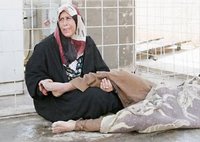
(The Face of Agony & Misery)
Gulf Monetary Union:
GCC monetary authorities are meeting in
Abu Dhabi this week.Among the topics of discussion will be the plan for monetary union between member states. This will be based on the European example, with a central Monetary Authority based on the ECB. Leaders of the GCC had agreed in 2001 to aim for monetary union by January 2010. It is not clear whether the real implications of monetary union are understood by the political leaders, or whether the finance and economic officials understand them to a degree that they can explain what they entail to the leadership- provided that they have the gumption to do so. It is not clear if broad and serious policy coordination steps are being take to make it possible to achieve the union by 2010. Recently some officials have been backtracking about the likelihood of meeting the deadline. GCC officials claim that the union will eliminate the costs of currency conversion and ‘increase trade between members’. Does this mean they will export more petroleum and natural gas to each other?
The issue of a unified currency was first discussed in 1975, long before the GCC was formed- it was originally discussed only between Kuwait, Bahrain, United Arab Emirates, and Qatar. That was before Saudi Arabia came to be considered a 'Gulf' country. Studies were commissioned by some well-known international economists of the time, foremost among them Robert Mundell who prepared the first study in 1975-76 and later won the Nobel Prize (definitely not for that paper). Later, with the inclusion of Oman and Saudi Arabia, currency unification was dropped. At one point in the 1970s even Iraq was included in monetary consultations among Gulf Arab countries, although some of the members resented that. Oman used to be a pariah among the pan-Arabists of the time who dominated the Kuwait foreign ministry for decades (until the Iraq invasion of 1990), because the Sultan was involved in a mini civil war against some guerrillas and had enlisted British and Iranian (under the Shah) help.
It is also not clear what this new currency will be called. The problem in this age of fundamentalism, actually petro-fundamentalism because that is what has been fueling it, is that all national currencies have foreign kaffir (that is heathen to most of you) names. The Dinar (Kuwait and Bahrain) has pagan roots, since it comes from the ancient Roman Dinarius, used over two thousand years ago, since before Christ and before Caesar. The Riyal or Rial (Saudi Arabia, Qatar, Oman) comes from the Spanish 'Real' meaning Royal. So will we use a currency named for Fernando and Ysabel, the conquerors of Grenada- perhaps the very Catholic currency of the distasteful Torquemada who dreamed of oro of los Indios in this world and heavenly edification in the other? As for the Dirham (UAE), it is most likely named after the old Greek Draxma. But don't tell the fundamentalists what they probably know, because if you do, then they might have to do something about it. Some of them probably believe that these currency names came with the scripture.
Iraqi Coup Report (Again):
London-based has Alhayat published a report by one of its columnists about the rumors of a coup in Iraq. The report (10/29/06) says that even though these rumors have been discounted publicly, they are in fact taken seriously within American research centers, among the security agencies, policy advisers and among ‘decision makers’ in Washington. Presumably the initial rumors were spread by U.S agencies as trial balloons, with the possibility of implementing them by suspending the (Iraqi) constitution, dissolving parliament, dismissing the government, and declaring emergency law. Discussion within the ‘Green Zone’ has now gone beyond the ‘if and how’ and it now centers on the persons who will be the front for this coup. US and British troops will defend the new regime against opponents- perhaps they will do a better job than they have been doing so far. The new mantra will be ‘security and stability’ instead of ‘democracy and freedom’. Does this ring a recent bell?
This coup plan includes measures to crush the expected opposition, mostly from the majority Shia’s who stand to lose the most. It also includes plots to assassinate some leaders who are expected to cause the most trouble after the coup. The new regime will be called a government of ‘National Salvation’- not very original, but telling. It is claimed that the Baker-Hamilton group has emphasized the importance of ‘security and stability’ as well- that is, post-coup stability. The report claims that this explains the increased ‘flirting’ as it is called, recently between U.S authorities in Iraq and the Sunni terrorist/insurgent groups. The leaders of the coup will be some high-ranking officers of the old ‘Ba’ath’ military, many of whom have established close relations with the U.S intelligence services and with several neighboring autocratic Arab regimes.
However, the report cautions that Iraqi military units might respond to a coup by siding with their respective sectarian sides, which would effectively mean a classic civil war. The report says that the U.S administration is mainly concerned with extricating itself from Iraq soon, and that some Iraqi politicians (has beens) are encouraging a coup as the only means for them to have a leading role in Iraq again. On the other hand, this will be considered a betrayal by the Coalition of the values and principles that were used to justify the invasion, post-invasion.
Back in Iraq:
Looks like Prime Minister al-Maliki has finally had his inevitable confrontation with U.S ambassador in Baghdad, during which he said that he is a friend of the US but that he is not 'the United States's man in Iraq'. Al-Maliki apparently is as frustrated with the Americans over there as they are with him, and has complained about the confusing array of American commands (military and civilian) that he has to deal with- it is confusing even to most American experts. Reading Bob Woodward's 'State of Denial' is helpful in understanding the roots and the degree of confusion of United States policy 'inside' Iraq, and why it is even more confusing to al-Maliki and other Iraqi officials. Now the Prime Minister and President Bush have agreed to form a team of four high ranking officials to sort things out.
Cheers
Mohammed
